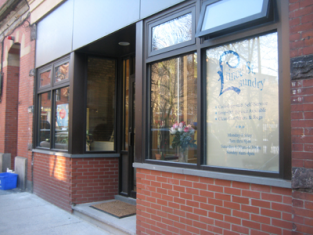The most important community spots are often the least celebrated.
When I first moved to the North End in 1991, the Italian section of Boston had largely gone unchanged for decades. It was the affordable part of Boston back then. My street level two-bedroom apartment at 4A Prince (currently the location of the restaurant Artu) was $625 per month. The European, Florence’s, and Felicia’s were the go-to restaurants. Pizza could be had at Regina’s, Circle Pizza, Café Pompeii, and Umberto’s (although every pizza in the North End has its own distinct style and taste).
Though Mike’s Pastry was already a local stop for tourists, traditional family-run bakeries like Parziale’s and Boschetto’s were the local haunts of those in the know. There was no Rose Kennedy Greenway, only the green expressway separating the historic Italian enclave from the rest of Boston. There was no CVS, no Dunkin’ Donuts, although one eventually came and went on Salem Street, and Starbucks had yet to invade the East Coast.
Over the past three decades, the city of Boston has changed. And while many businesses in the North End have gone the way of the New World Bank that once operated on Hanover Street, there is a laundromat at 22 Prince that is still going strong, and in doing so has deservedly become one of the standard-bearers of this post-Big Dig North End neighborhood.

I first walked into Prince St. Laundry (informally known as Isabel’s to the locals) one night during the summer of 1991. On any given visit you could expect to see Isabel, her mother Rosa, and/or Anna—the three making up the entire staff. Isabel was young, motivated, hard-working, clearly in charge, and would gladly tell you that she was Portuguese and not Italian. Watching me from the corner of her eye, she once took it upon herself to use her own quarters to buy extra detergent and then promptly push me aside, pour the extra detergent forcefully over my laundry, close the lid of the machine, push the requisite buttons to set it into action, and then turned to me saying something like, “How are your clothes ever going to get clean, Jay, if you don’t use enough detergent?” Enough said. I have not done a load of laundry since without thinking of Isabel’s subtle recommendation.
Isabel and I became fast friends. She convinced me on more than one occasion to get more active in community events, including a rather heated meeting at the Nazzaro Center with city planners trying to convince North End residents that it was time to dig up Columbus Park alongside the Marriott Long Wharf citing that the trees there were well past their age of maturity evidenced by the fact that the park had been built in 1982. In response, an older Italian man stood up finally silencing the city planner suggesting that Boston should then also tear up the Public Garden, the trees there being hundreds of years past their age of maturity.
Isabel’s laundromat was the hub of the neighborhood in our corner of the North End. It was the place where you often ran into the same people, and because everyone in the process of doing laundry is usually dressed comfortably, certainly without style in mind, you were left feeling the same way you might if casually hanging around in your living room wearing an old pair of jeans or pajamas.
Doing laundry at Isabel’s was an enjoyable ritual usually resulting in conversation with people, catching up on what was happening in the North End. I almost never went back to my apartment while doing laundry, for instance, even though it was only a short walk away. One morning people were sharing stories about a Salem Street butcher that was suspiciously robbed hours before. Another day, I recall chatter about some break-ins by way of fire escape at which point a local man decisively interjected that it would be taken care of (insinuating that police would not be called upon to settle the problem). I was also at Isabel’s years later during the morning of the 9/11 attacks, a customer curiously asking what movie we were watching as we all stared in disbelief at the laundromat’s low-volume television as it re-played footage of the first plane tragically hitting the World Trade Center which was sadly that morning’s news.
The North End is fortunate that Isabel did not sell her business during the mid-1990s, a possible direction she once suggested to me in conversation. Both the neighborhood and the city have changed a great deal since then. It would have been unthinkable at the time to suggest that not only would Florence’s, the European, Felicia’s, and Circle Pizza soon be gone from the North End, but also landmarks like Anthony’s, Jimmy’s, Durgin-Park, and Jacob Wirth’s from the city itself.
It is good to know that despite inevitable changes to this historically entrenched area of the city, Isabel’s Prince St. Laundry continues to not only be relevant, but is now a surviving business emblematic of the North End from years gone by, helping to carry the torch of this community forward.
I was tempted to stop in a few years back after having dinner at a restaurant across the street from Prince St. Laundry with an old friend who encouraged me to walk over to say hello when I saw Isabel step outside. I chose not to. There would not possibly be enough time for the two of us to catch up on everything that has happened over the past twenty years. That kind of a discussion will require a return to the North End and a gigantic load of laundry.
Jay Gillespie is a writer, singer/songwriter, and local historian.
December 31, 2020 at 01:32AM
https://northendwaterfront.com/2020/12/isabels-prince-st-laundry-a-community-friend-in-bostons-north-end/
Isabel's Prince St. Laundry, a Community Friend in Boston's North End - NorthEndWaterfront.com
https://news.google.com/search?q=Laundry&hl=en-US&gl=US&ceid=US:en


No comments:
Post a Comment